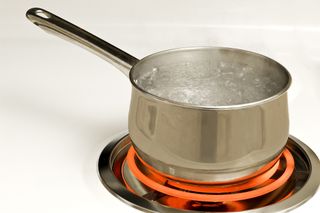Boiling tap water can remove nearly 90% of microplastics, new study finds
Tiny plastic particles float inside tap water, and it's still unclear how they impact our health. But boiling the water for 5 minutes could remove most of these microplastics, a new study finds.

Boiling tap water before drinking it can remove at least 90% of potentially harmful microplastics, a new study has found.
Microplastics are tiny pieces of plastic debris measuring less than 0.2 inches (5 millimeters) long, according to the National Oceanic and Atmospheric Administration (NOAA). These broken-down remnants of industrial waste and consumer goods are impossible to avoid: they are found across the ocean and atmosphere, inside bottled water and even in human poop.
Studies into how microplastics impact human health are still scant and inconclusive, according to the World Health Organization. So far, some plastics are thought to be harmless, whereas others, such as polystyrene, have been shown to kill human cells, cause bowel inflammation and reduce fertility in mice.
In a new study, published Feb. 28 in the journal Environmental Science and Technology Letters, scientists looked into practical home methods to remove the tiny plastics from drinking water. One question they were particularly concerned with was whether boiling water could rid it of microplastic contamination.
"Drinking boiled water, an ancient tradition in some Asian countries, is supposedly beneficial for human health, as boiling can remove some chemicals and most biological substances," the researchers wrote in the new study. "However, it remains unclear whether boiling is effective in removing NMPs [nano/microplastics] in tap water."
Related: Humans inhale a credit card's worth of microplastics every week. Here's where it ends up.
To investigate, the researchers created samples of tap water containing many of the commonly occurring minerals alongside three commonly occuring microplastic compounds: polystyrene, polyethylene, and polypropylene. The researchers also varied the "hardness" of the water samples by adjusting the concentrations of calcium carbonate. (A vast majority of American homes use hard water, meaning the water has a high mineral content.)
Sign up for the Live Science daily newsletter now
Get the world’s most fascinating discoveries delivered straight to your inbox.
After boiling the samples for 5 minutes and leaving them to cool, the researchers noted a drastic decline in the amount of microplastics. In harder water, there was a nearly 90% reduction in microplastics, because the calcium carbonate in the water became solid at higher temperatures, trapping the plastic particles within.
The researchers say that using this method alongside a simple coffee filter to remove the solidified calcium could be an easy way to remove the potentially health-damaging particles.
The effectiveness of point-of-use filters on their own is unclear due to insufficient research, although one study suggested that microfiltration filters could be usedto snag and remove stray particles.

Ben Turner is a U.K. based staff writer at Live Science. He covers physics and astronomy, among other topics like tech and climate change. He graduated from University College London with a degree in particle physics before training as a journalist. When he's not writing, Ben enjoys reading literature, playing the guitar and embarrassing himself with chess.
